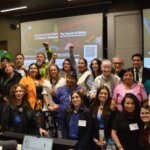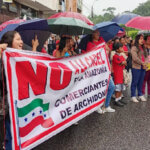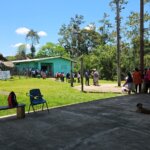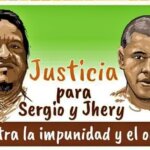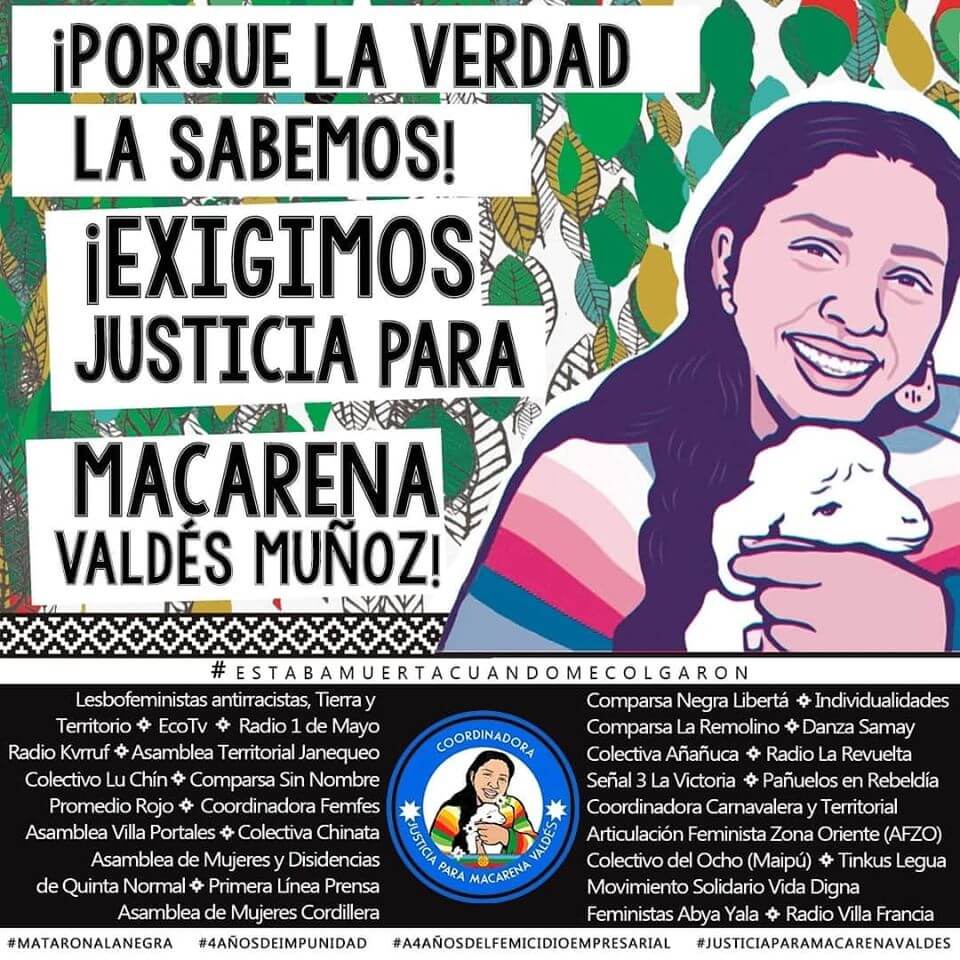El 14 de julio, mientras la Amazonía ecuatoriana enfrentaba el caos, el pánico y el miedo provocado por la crisis sanitaria del COVID-19, la empresa minera canadiense Solaris Resources celebraba su cotización en la Bolsa de Valores de Toronto (TSX-V). Luego lanzó una campaña en Twitter para alardear de sus “exitosas alianzas comunitarias” en torno a su proyecto Warintza para extraer oro y cobre; así como sus éxitos con el “nuevo proceso de consulta” realizado con los indígenas Shuar de las comunidades de Warints y Yawi.
La pandemia está azotando el territorio indígena Shuar en Ecuador, donde las empresas mineras canadienses continúan operando, volando en helicópteros sobre las comunidades que luchan por lidiar con los casos de COVID y sus fallecidos. Hasta el 27 de julio de 2020, 443 Shuar dieron positivo para el virus, hay 89 casos sospechosos y se han confirmado 9 muertes. A principios de este año el gobierno del Shuar Arutam (PSHA) y más de cien organizaciones internacionales denunciaron a la empresa Solaris Resources por su irresponsable papel en llevar el virus a su territorio, una acusación que la compañía niega.
El gobierno de Shuar Arutam (PSHA), totalmente abandonado por el gobierno ecuatoriano pro-minero, se ha visto obligado a defenderse por todos los costados: primero, para proteger a sus miembros mediante la movilización de brigadas médicas para evaluar y prestar atención a la creciente cantidad de miembros de la comunidad indígena que viven lejos de los servicios médicos; segundo, ayudar a las familias con arreglos de entierro; tercero, para proporcionar sustento a las familias y apoyo a la crisis económica que se avecina en la región; finalmente, para defenderse de una compañía minera que continúa, a pesar del firme rechazo de la comunidad indígena, avanzando en sus trabajos sobre el territorio Shuar, poniendo las comunidades en riesgo de infección, fomentando tensiones internas y construyendo su imagen empresarial para potenciales inversores extranjeros.
Sin embargo, como señaló la PSHA en declaración pública reciente, esa imagen se basa en la fabricación deliberada de un proceso de consulta falso, sin legitimidad para la organización interna de los pueblos Shuar Arutam. Está claro, según la información colocada en las redes sociales, que la empresa busca generar inversiones con base en este proceso de consulta. Solaris Resources quiere demostrar que encontró la clave para desbloquear la Amazonía ecuatoriana para los inversores mineros, una región que siempre ha expresado su firme oposición a la minería, por el daño que esta actividad ocasionará al ecosistema, las comunidades y economías indígenas. Sin embargo, Solaris no dice que el proceso de consulta ignoró deliberadamente la organización política de las comunidades en la región, y que la presencia de la compañía está produciendo fuertes tensiones y riesgos de seguridad para los líderes de la organización.
El gobierno Shuar Arutam es la organización política de los pueblos Shuar Arutam, habitantes de la provincia de Morona-Santiago en la Amazonía ecuatoriana. Abarca 47 comunidades y 6 asociaciones que viven dentro y alrededor del proyecto propuesto de Warintza, pero también mucho más allá de ello. La PSHA realiza asambleas generales donde reúne a todos sus miembros para tomar decisiones; en la asamblea del pasado agosto de 2019 confirmaron que la minería es contraria al “Plan de Vida” de la PSHA, un plan concebido para proteger la biodiversidad de la región de la cual las comunidades dependen. De acuerdo con su última declaración, ante las amenazas continuas de Solaris, la PSHA manifiesta:
“Nos declaramos un Territorio Integral en el cual luchamos por la defensa de nuestra tierra, nuestros bosques y la revalorización de nuestra cultura. La humanidad debe tomar en cuenta que nuestros territorios, nuestros bosques y nuestro conocimiento son de vital importancia para hacer frente a la crisis climática que está ocurriendo en el Planeta, por lo tanto, nos declaramos en defensa de la vida”
La PSHA también ha declarado, en múltiples ocasiones, que las compañías mineras deben abandonar sus territorios, y que cualquier acuerdo firmado entre exlíderes de la PSHA y las empresas terminó cuando los mandatos de esos líderes terminaron.
El 24 de julio, Solaris señaló en su cuenta de Twitter que inversores como Ross Beaty, Daniel Earle y Equinox Gold (todos canadienses) son sus “aliados estratégicos”. Ross Beaty posee el 5% de las acciones de Solaris y es el fundador, CEO y accionista importante de Equinox Gold. No es sorprendente, entonces, que la primera empresa de Ross Beaty, Pan American Silver, esté participando en un proceso de consulta discriminatorio e ilegal que involucra a los pueblos Indígenas Xinka (Guatemala) habitantes cercanos de su mina Escobal. La estrategia parece ser continuar socavando la autodeterminación y la oposición indígena mediante consultas engañosas y al mismo tiempo presentar estas actividades a los inversores como “relaciones comunitarias responsables e inclusivas”.
En ambos casos citados, la actividad minera genera amenazas, intimidaciones y rupturas del tejido social básico para sostener la solidaridad y la prosperidad en las comunidades indígenas, esta situación hace más críticos el bienestar y la salud en tiempos de crisis como la pandemia actual.
Para obtener más información sobre la resistencia Xinka a la mina Escobal, incluidos videos que el Parlamento Indígena Xinka está publicando en respuesta a las acciones de Pan American Silver con respecto al proceso de consulta, visite este nuevo sitio web: resistescobal.com
Puede leer la declaración completa de PSHA aquí.
Indigenous Shuar Arutam Government in Ecuador Calls Out Canadian Mining Company’s Sham Consultation Process.
On July 14th, as havoc, panic, and fear caused by COVID-19 continues to sweep through the Ecuadorian Amazon, Canadian company Solaris Resources celebrated its new listing on the Toronto Stock Exchange’s Venture Exchange (TSX-V). It then proceeded to launch a two-week Twitter campaign championing its successful community alliances around its Warintza copper-gold project, and their successes with the “novel consultation process” with Indigenous Shuar Warints and Yawi communities.
The global pandemic is raging through Indigenous Shuar territory in Ecuador, where Canadian companies continue to operate, flying helicopters over communities that are struggling to deal with mounting COVID cases – and fatalities. As of July 27, 2020, 443 Shuar tested positive for the virus with another 82 suspected cases, and 9 deaths have been confirmed along with another 7 suspected. Earlier this year the Shuar Arutam government (PSHA) and over a hundred international organizations condemned the company for its role in bringing the virus into their territory, an accusations the company denies.
The Shuar Arutam government (PSHA from its initials in Spanish), totally abandoned by the pro-mining Ecuadorian government, has been forced to defend itself on all sides: protecting its members by mobilizing medical brigades to test and provide care for the mounting numbers of Indigenous community members who live far from medical services; assisting families with burial arrangements; trying to provide sustenance for families and support for the economic crisis looming in the region; but also having to defend itself against a mining company that continues – despite the Indigenous community’s firm rejection – to push itself deeper into Shuar territory, putting communities at risk of infection, fomenting internal tensions, and building up its image to potential foreign investors.
However, as the PSHA noted in a recent public statement (translated below), that image is built on a deliberate fabrication of a sham consultation process which has no legitimacy for the internal organization of the Shuar Arutam peoples. It has become clear during Solaris’ investor campaign roll-out that the company is pinning its pitch to investors on this consultation process: it has found the magical key to unlocking the Ecuadorian Amazon for mining investors – a region which has always opposed mining for the damage it will do to the ecosystem and Indigenous societies and economies. What Solaris doesn’t say, however, is that the consultation process is deliberately ignoring the political organization of communities in the region, and that the company’s presence is producing heightened tensions and security risks for the leaders of the organization.
The Shuar Arutam government is the overarching political organization of the Shuar Arutam peoples who inhabit the province of Morona-Santiago in the Ecuadorian Amazon. It encompasses 47 communities and 6 associations who live in and around the proposed Warintza project, but also much beyond it. The PSHA holds general assemblies where it brings together all its members to make decisions, and at one such assembly last August, 2019, they confirmed that mining goes against the PSHA’s “Life Plan”, a plan to protect the biodiversity of the region upon which the communities depend. According to its recent statement in the face of these ongoing threats by Solaris, the PSHA:
“declare Warintza to be a Protected Area within which we will fight in defence of our land, our forests, and the recognition and appreciation of our culture. The world must understand that our land, forests, and knowledge are vitally important to confront the current environmental crisis facing our planet; therefore, we express our support for life.”
The PSHA also has declared on multiple occasions that mining companies need to leave their territories, and that any agreements that were signed between former PSHA leaders and the companies were terminated when those leader’s mandates ended.
On July 24, Solaris noted in a post on its Twitter account that investors like Ross Beaty, Daniel Earle and Equinox Gold (all Canadian) are the company’s “strategic allies”. Ross Beaty currently owns 5% of outstanding shares of Solaris and is the founder, CEO and important shareholder of Equinox Gold. It doesn’t come as a surprise, then, that Ross Beaty’s original flagship company, Pan American Silver, is engaging in a discriminatory and illegal consultation process involving the Indigeonus Xinka peoples in Guatemala around its Escobal mine. The strategy seems to be to continue to undermine Indigenous self-determination and opposition, all the while presenting those operations to the investment community as responsible and inclusive.
In both cases, mining development has led to threats, intimidation, and a rupturing of the social fabric which is so important to keep Indigenous communities thriving, and which is even more critical during times of crisis like the current pandemic.
For more information on the Xinka resistance to the Escobal mine, including amazing videos the Indigenous Xinka Parliament is putting out in response to Pan American Silver’s pursuit of this consultation process, visit this new website: resistescobal.com.
Stay tuned for more information on how to support the PSHA in their plight to protect the health and biodiversity of their communities.
You can read the full PSHA statement here below:
—
The Shuar Arutam People have decided: NO to Mining. We don’t want to be consulted.
Faced with the malicious and unfounded postings on social media by Canadian company Solaris Resources regarding mining exploration in Warintza during a time of an exceptional health emergency throughout the territory of the Morona-Santiago Province, the Shuar Arutam People (PSHA in Spanish) hereby declares:
The Shuar Arutam Government Council (CGPSHA in Spanish) is the highest authority and the sole legal representative of the forty-seven communities and six associations that make up the Shuar Arutam People, legitimately elected at the General Assembly on March 31, 2019 and approved by the Secretary of Human Rights and Education on December 27, 2019 (Official Ruling No. SDH-CAJ-2019-1528-O). In compliance with the mandate of the Political Constitution of Ecuador (Articles 56 and 57) and articulated in ILO Convention 169, Indigenous people’s rights are inviolable, their territories are protected and imprescriptible, and, through the resolutions and powers conferred by the Statutes of the CGPSHA and the Life Plan developed by the Shuar Arutam people, we publicly proclaim that:
- We categorically reject the Agreements signed between Sr. Vincente Tsakim, ex-president of PHSA, and administrators of the Warints and Yawi Centres and Solaris Resources. The Free, Prior and Informed Consultation process will not be carried out in the Shuar Arutam People’s Territory due to the manipulation and attacks we have endured against our cultural identity, our cosmovision, and our philosophy. We are the defenders of life and the natural environment of the Andean Condor Mountain Range (Cordillera del Cóndor). As a result of the negative impact of this consultation process on our communities, discussions have been terminated and the company is requested to leave immediately. Failure to comply with this request will result in further defensive actions of resistance.
- We are united in defence of the Land, the Water and the Collective Rights of the People and Nationalities, and demand that the autonomy and self-determination of the Shuar Arutam People be respected.
- In the face of threats by the Canadian company Solaris Resources Inc., we, in the Warintza centre, declare Warintza to be a Protected Area within which we will fight in defence of our land, our forests, and the recognition and appreciation of our culture. The world must understand that our land, forests, and knowledge are vitally important to confront the current environmental crisis facing our planet; therefore, we express our support for life.
- We ask that human rights organizations, such as those involved in the Inter-American Human Rights System and the United Nations, recognize the violations of the rights of our people and First Nations committed by the State of Ecuador by imposing extractive projects without our People’s consultation or consent, even during a health emergency.
- The company’s actions are reprehensible. We assume that, as has been done in the past, this unlawful agreement will be used to try to demonstrate that this project has the support of the communities and associations that make up the Shuar Arutam People; however, we stress that the support they have from a minority is the result of illegal and illegitimate dealings on the part of Solaris Resources in our territory; all the while, the Assemblies of the forty-seven communities have demonstrated against mining for some twenty years. We therefore reject any so-called consultation carried out by Solaris Resources on our land.
-signed-
Prof. Josefina Tunki
President of the Shuar Arutam People
Last modified: 12/08/2020



